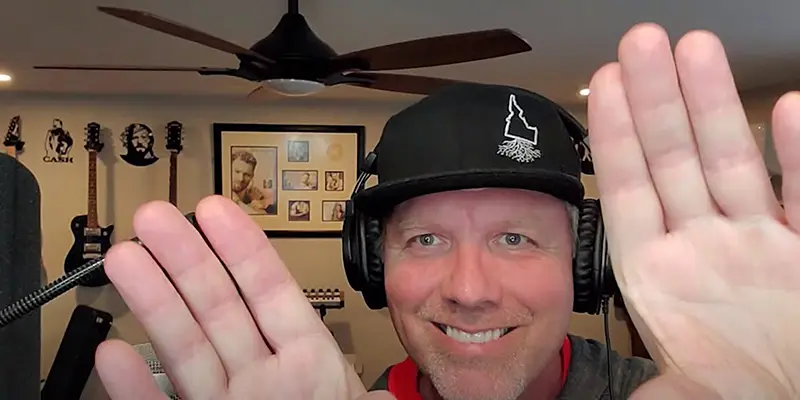
As a society, we tend to look down on mental health problems and focus solely on the negative aspects of these issues. One psychiatrist at Amen Clinics says that’s the wrong approach. In fact, according to Daniel Emina, MD, in some instances, it’s better to think of specific challenges as superpowers. In an episode of Scan My Brain with Derek Clark, a motivational speaker known as the “Rapping Dad,” Dr. Emina explains why people with certain psychiatric issues are like superheroes. Before delving into this superhero concept, let’s look at how Clark went from being an emotional wreck to finding his superpowers.
In a session with Derek Clark, a motivational speaker known as the “Rapping Dad,” Dr. Emina explains why people with certain psychiatric issues are like superheroes. Click To Tweet
How Trauma Ignites the Emotional Brain
As a child, Clark experienced horrific abuse and emotional distress prior to being abandoned at age 5. Growing up in the foster care system, he struggled with extreme anxiety, had learning disabilities, displayed aggression, and couldn’t concentrate. Filled with emotional stress, he withdrew from reality. Psychological assessments left him misdiagnosed and labeled in ways that negatively impacted his self-esteem. For many years, Clark lived with anger, bitterness, resentment, rage, and sadness related to his upbringing.
In 2021, Clark wanted to see how that childhood emotional trauma may have affected his brain, so he visited Amen Clinics for a brain SPECT scan. SPECT is a functional brain imaging tool that looks at blood flow and activity. SPECT reveals 3 important factors about the brain—areas with healthy activity, too little activity, and too much activity.
Like many people who experience trauma, Clark’s SPECT scan showed increased activity in the emotional centers of the brain. Overactivity in this brain region makes people more vulnerable to anxiety, depression, panic attacks, negativity, worry, and obsessive thoughts.
Seeing his brain scan helped Clark gain a better understanding of himself. He says it’s like “I’ve been emotionally fighting against my brain—fighting my thoughts, fighting my worries, fighting my stress, fighting my anxiety.” That’s how many trauma survivors feel as if they’re battling their automatic thoughts and feelings.
Turning Pain into Purpose
At age 16, when Clark was still mired in angst, he saw two kids doing a rap battle and was instantly enthralled. “I have to do this,” he thought. Rapping became a way for him to express himself and get his anger out in an artistic fashion. The creative outlet helped him turn his life around and change his outlook on life. By the age of 21, he discovered how to “divorce his story and go from a victim mindset to feeling like a victor.”
Going to therapy helped him build a psychological toolbox that allowed him to strengthen his emotional fortitude and gain better control over his anxious thoughts, anger, and emotions.
This set the stage for him to connect with other trauma survivors and become a motivational and inspirational speaker on the topics of childhood trauma and resilience. He’s also an author of 7 books and his viral rap videos have over 250 million views. These days, Clark likes to call himself a “hope dealer, not a dope dealer.”
At times, Clark channels his powerful emotions into his work, losing himself in what he calls the “Derek Zone.” When he’s working on a book, for example, he can write for 16-18 hours a day.
That’s what Dr. Emina says is one of Clark’s superpowers.
Turn Emotional Challenges into Superpowers
According to Dr. Emina, people with an overactive emotional brain like Clark’s are like superheroes. They have an ability to feel things—the good and the bad—more richly and more deeply. They can also be highly motivated and persistent.
“They have a superpower, but they have to learn to control it,” says Dr. Emina. “In those superhero movies, in the first half of the movie, the soon-to-be hero initially doesn’t know how to control their superpower. They’re shooting lasers out of their eyes, blowing things up, and breaking things. Learning to control your emotional brain can be like that.” But at a pivotal point in the movie, they discover their true power, their true self, and learn to harness it for good.
Just as Clark was able to gain control of his emotions and turn his pain into purpose, you too can access the tools needed to harness your superpower and make it work for you instead of against you. Engaging in psychotherapy and optimizing brain health will help you attain the emotional control you want, so you can unleash your superpowers in a positive way.
Emotional trauma and other mental health issues can’t wait. At Amen Clinics, we’re here for you. We offer in-clinic brain scanning and appointments, as well as mental telehealth, clinical evaluations, and therapy for adults, teens, children, and couples. Find out more by speaking to a specialist today at 888-288-9834 or visit our contact page here.





I believe that if someone has mental health issues and they try to get rid of them the there are therapists who does their best to overcome mental health issues. Last year I also suffer from some kind of mental health issue and get therapy from a well-known therapist and by their techniques and expertise now I’m completely fine and living mu life happily.
Comment by African American therapist California — December 16, 2021 @ 10:25 PM
finding a good therapist whom you can be really opened up to is hard but not impossible. i would suggest being determined to be open to every little thing you have to say to get healthy again.
Comment by despre narcisism — January 1, 2022 @ 11:42 AM
Great article. I think there us a genetic predisposition to ALL Mental Health issues, however, they may be more inense and disruptive, when coupled with trauma, especially in childhood. The first 5 years .
Comment by Joy — October 16, 2023 @ 6:39 AM